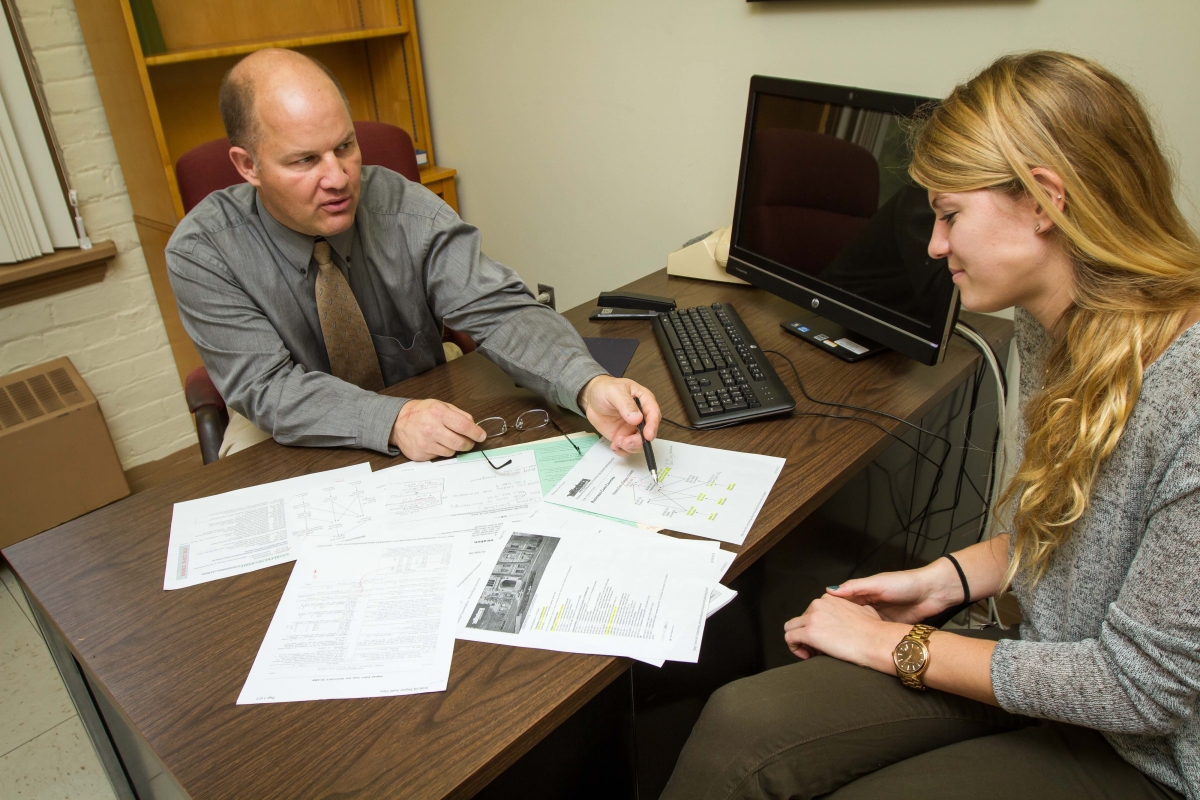In recent years, the relevance of big data has increased exponentially in society, inherently changing the way people live and work.
Recognizing the impact of big data in solving real-world problems, Wittenberg has launched a master of science in analytics through its School of Community Education. With its first enrollees arriving this fall, the new program will offer students a unique blend of breadth and depth as it prepares them to lead in a diverse array of professional settings, as well as meet the nationwide demand for employees who understand the intricacies and complexity of big data.
The field of analytics is where the best practices in intellectual inquiry are emerging to create expansive opportunities for those who can combine a deep interest in solving problems with the effective use of analytical techniques -- while still understanding and appreciating the human and contextual issues that come into play.
 “The analytics program is Wittenberg’s first master of science degree program and what we believe to be a perfect intersection of Wittenberg’s mission with an area of great educational and professional opportunity for our students,” said Tom Kaplan, dean of the School of Community Education. “Wittenberg’s program utilizes a hybrid model that blends monthly periods of residency (three consecutive days per month on campus) with individual and group online work between residency periods. The cohort model and routine residency periods will offer students needed support from instructors and peers, and the ability to build enduring and valuable professional relationships early in their careers. Time between residency periods is spent working on projects, case studies and assignments provided by industry experts.”
“The analytics program is Wittenberg’s first master of science degree program and what we believe to be a perfect intersection of Wittenberg’s mission with an area of great educational and professional opportunity for our students,” said Tom Kaplan, dean of the School of Community Education. “Wittenberg’s program utilizes a hybrid model that blends monthly periods of residency (three consecutive days per month on campus) with individual and group online work between residency periods. The cohort model and routine residency periods will offer students needed support from instructors and peers, and the ability to build enduring and valuable professional relationships early in their careers. Time between residency periods is spent working on projects, case studies and assignments provided by industry experts.”
The 12-month program is built to meet the needs of working professionals as well as recent graduates with an interest in analytics. Committed problem-solvers from a wide range of undergraduate backgrounds will find success in the program.
The following Q&A with Kaplan provides a more in-depth look at Wittenberg's latest graduate program.
Q: What is unique about Wittenberg’s program?
Kaplan: One unique feature is the requirement that each student design and complete an original capstone project that addresses a problem or opportunity that is both practical and professionally relevant. Students completing their capstone projects benefit from faculty and other professionals who will both coach them and assess the results of their work. Each student’s final capstone presentation is delivered to a panel of professionals. The advisory board for the master of science in analytics program includes senior analytics professionals from a number of well-known companies in the area, including J.P. Morgan Chase & Co., Speedway LLC, Reynolds and Reynolds, the Assurant Group, Motorists Mutual Insurance Company, Cardinal Health, Platinum Data Solutions Inc., and other organizations, as well as some that are affiliated with Wright-Patterson Air Force Base. Our relationships with these companies will benefit our students both during and after their time with us.
Q: What are the costs and benefits of Wittenberg's program?
Kaplan: The cost of the program is $36,000 and includes all books and instructional materials and most meals during residency periods. Wittenberg alumni receive generous tuition discounts of $5,000.
While the master of science in analytics is a full-time program, it has been designed to balance several factors that are important to working professionals. It allows students to:
- Balance a rich graduate school experience while maintaining a full-time job.
- Engage in graduate school, work hard and complete the program in one year – all with a modest impact on each student’s time away from home and work.
- Develop strong professional connections with other students and prospective employers.
- Create a solid project portfolio to demonstrate the potential to add value to employers following completion of the program.
- Build skills that will endure for years to come, along with that flexibility to allow each student to add value in a wide variety of professional settings.
- Achieve rapid return-on-investment (ROI) with this degree – professionals in this field are enjoying high starting salaries and outstanding career paths.
Q: What does adding this program mean to Wittenberg now and in the future?
Kaplan: The program’s launch out of the School of Community Education aims to involve faculty from business, mathematics and other departments across campus, while bringing the marketing and administration functions together in one place. Our experience launching the analytics program will serve as a base from which we can build and launch other exciting graduate programs in a wide variety of areas. The program should benefit Wittenberg in other ways as well.
First, it exemplifies Wittenberg’s mission, especially our commitment to intellectual inquiry and wholeness of person. Issues related to data and analytics are central to the big problems and opportunities that exist in many fields. This will allow students from many undergraduate areas – Wittenberg graduates and others – to succeed in the program.
Second, it will create a way for us to engage a new group of students at the graduate level – working professionals in technical fields – in ways that have not previously been possible here at Wittenberg. Following completion of the program, our analytics graduates will be well equipped to pursue careers in a very wide range of fields.
Q: How many courses are there and how many professors will teach these courses?
Kaplan: The program consists of nine courses over 12 months. As students progress through the curriculum, they also propose, plan, develop and present their individual capstone/thesis project. This four-part capstone experience represents a unique element of Wittenberg’s program.
Each course will be taught by a mix of full-time Wittenberg faculty members and experienced analytics professionals from a variety of industries. In addition to each course being taught by one lead professor, we also anticipates involving multiple faculty and guest lecturers during every residency period. We are already seeing evidence that our hybrid delivery model is attracting some fantastic people to teach in our program or come to Wittenberg for a day to speak about their industry experience and provide students with real-world case studies. This will ensure dynamic and robust coverage of every key topic and its linkage to a broad array of organizational challenges and opportunities.
Q: Will there be a job available for these students once they graduate?
Kaplan: While research suggests that demand for analytics professionals more than doubled over the course of four years, new college graduates have not been the only source of qualified candidates for employment. A significant number of data scientists and analysts moved into the field from other jobs and industries. According to Market Watch, more than one-in-five adults wanted to change careers in 2014 (the latest dataset available), which was a notable increase compared to the previous five years.
According to Wittenberg Director of Analytics Gene Pierce, the amount of data being collected by companies in nearly every economic sector is on the rise, and therefore every industry needs people who can interpret, analyze and put that data to work. Being able to harness data effectively creates a competitive edge for a business and puts people with these skills in high demand.
A 2011 report by McKinsey Global Institute projected a 40 percent growth in global data generated per year meaning U.S. companies will need to hire 1.5 million more data-savvy managers to take full advantage of big data.
From determining what people are talking about on social media to deterring terrorism, analytics has been a game changer in many industries. As a result of the growing job demands, there has been a large increase in recent years in undergraduate, but especially graduate programs in analytics.
For more information on the program or to apply, visit www.wittenberg.edu or email analytics@wittenberg.edu.







